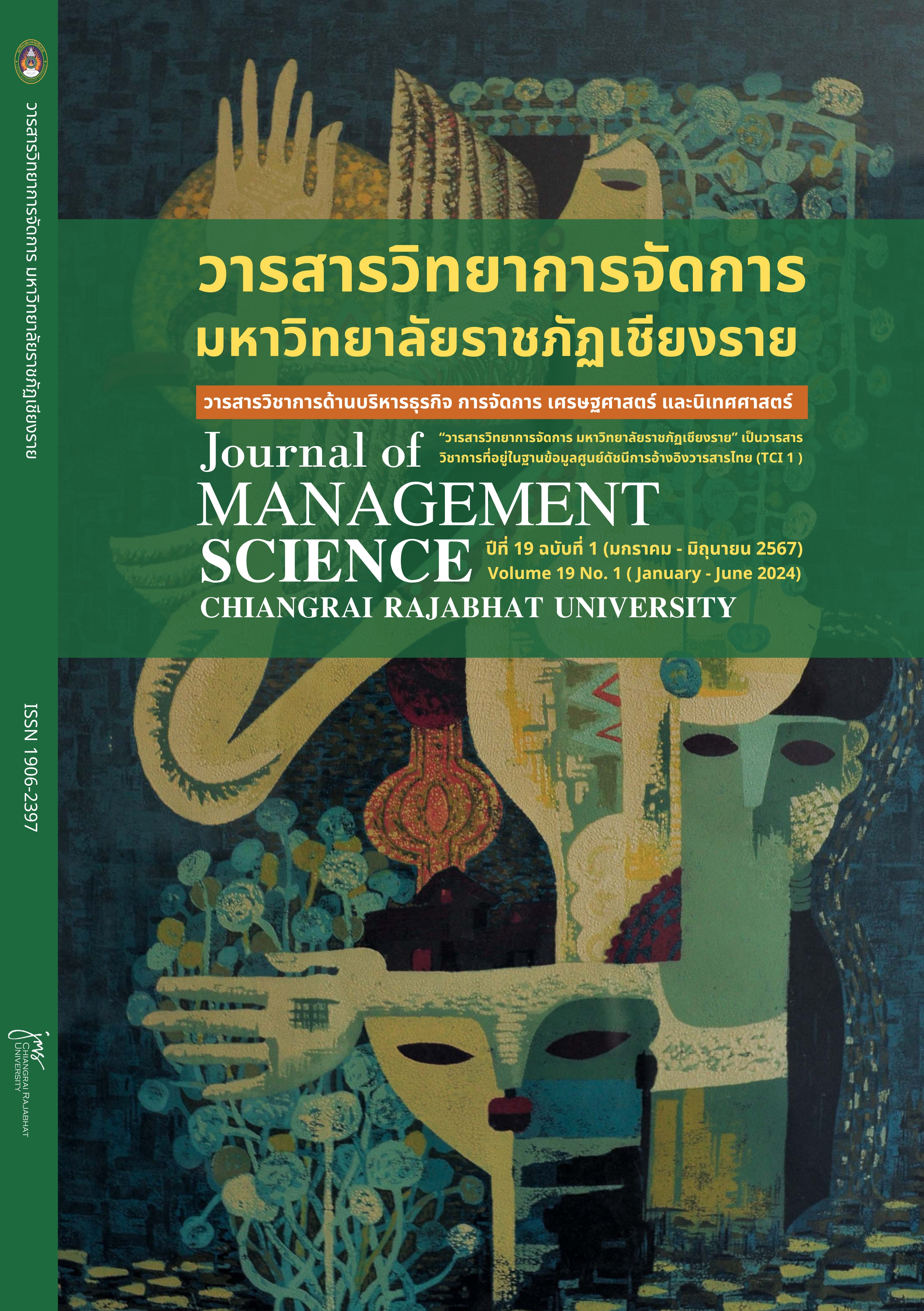Fostering Misinformation Resilience through Active Learning
Main Article Content
Abstract
This research aims to (1) investigate the perception of fake news among students and community representatives residing along the Prem Prachakon canal in Bangkok, Thailand, and
(2) develop their fake news literacy skills. The study draws upon the concepts of media literacy, fake news, and game-based learning, utilizing both quantitative and qualitative research methodologies. Participants include 121 communication arts students from the Faculty of Management Science at Phranakhon Rajabhat University and community representatives from the Prem Prachakon canal area. Research tools included an active learning plan, surveys, in-depth interviews, and observation records.
The findings revealed that (1) both students and community members primarily encountered fake news through online channels, particularly Facebook, with health-related information and online scams being the most common types, particularly phone scams by call center gangs (42.1%), sales scams (35.5%), and romance scams (14.0%). (2) The active learning plan "Developing Fake News Literacy Skills" effectively enhanced fake news literacy skills in both groups. Community representatives demonstrated increased awareness and intention to verify information, while students better understood fake news verification principles and types of misinformation. Additionally, both groups exhibited improved fake news literacy skills, including identifying fake news characteristics, assessing information credibility, and recognizing the impact of fake news.
Article Details

This work is licensed under a Creative Commons Attribution-NonCommercial-NoDerivatives 4.0 International License.
Views and opinions expressed in the journal do not necessarily reflect those of the editors.
References
Aphiwanthanakorn, T. (2009). Process learning toward media literacy. (2th ed.). Bangkok: Thai Health Promotion Foundation.
Chanrungmaneekul, U. (2006). Opening the curtain of media literacy. In Opening the Door to Media Literacy: Concepts, Theories, and Experiences of Media Literacy for Health. Nonthaburi: Thai Health Promotion Foundation.
Connected Canadians. (2023). Digital literacy workshop: recognizing fake news [Workshop]. Retrieved from https://www.connectedcanadians.ca/events/2023/10/12/digital-literacy-workshop-recognizing-fake-news
Dame Adjin-Tettey, T. (2022). Combating fake news, disinformation, and misinformation: experimental evidence for media literacy education. Cogent arts & humanities, 9(1), 1–17.
Department for Digital, Culture, Media & Sport. (n.d.). SHARE Checklist [Brochure]. Retrieved from https://SHARE checklist.gov.uk/
Housand, B. (2018). Fighting Fake News! Grades 4-6: Teaching Critical Thinking and Media Literacy in a Digital Age. United Kingdom: Routledge.
Hobbs, R. (1999). The seven great debates in the media literacy movement. Journal of Communication, 48, 16–32.
Hobbs, R. (2011). Digital and media literacy: connecting culture and classroom. California: Corwin.
Intasara, W. (2019). Game-based learning: The latest trend education 2019. Suan Dusit University. Retrieved from https://fliphtml5.com/yrrqp/heos/basic
Ireton, C, & Posetti, J. (2020). Journalism, fake news & disinformation: handbook for journalism education and training. Bangkok: United Nations Educational, Scientific and Cultural Organization (UNESCO).
Jones-Jang, S. M., Mortensen, T., & Liu, J. (2021). Does media literacy help identification of fake news? Information Literacy helps, but other literacies don’t. American behavioral scientist, 65(2), 371-388.
Jongwilaikasaem, W., Anutarasoti, P., & Muangsuk, N. (2021). Fake News Fighter: a fact-checking mechanism in television and digital newsrooms. Bangkok: O.S. Printing House.
Leggett, J., & King-Reilly, R. B. (2020). In the age of fake news: engendering dialogue and critical media literacy through culturally responsive teaching. Currents in Teaching & Learning, 12(1), 6-18.
Literat, I., Chang, Y. K., & Hsu, S.-Y. (2020). Gamifying fake news: Engaging youth in the participatory design of news literacy games. Convergence, 26(3), 503–516.
Mostowfi, S., Koleini Mamaghani, N., & Khorramar, M. (2016). Designing playful learning by using educational board games for children in the age range of 7-12: (A case study: Recycling and waste separation education board game). International Journal of Environmental and Science Education, 11(12), 5453–5476.
Pérez-Escoda, A., Pedrero-Esteban, L. M., Rubio-Romero, J. C., & Jiménez-Narros, C. (2021). Fake news reaching young people on social networks: distrust challenging media literacy. Publications, 9(2), 1–16.
Pomichal, V., & Trnka, A. (2022). Fighting against fake news using the card game "Follow Me". In ECGBL 2022 16th European Conference on Game-Based Learning (pp. 357-364). Academic Conferences and Publishing Limited.
Potter, W. J. (2010). The State of media literacy. Journal of Broadcasting & Electronic Media, 54(4), 675–696.
Pounglek, W. (2023). Curriculum manual for developing and strengthening networks media consumers (Gender Diversity and Social Diversity Group), MODULE 1: Know the media. Bangkok: NBTC Office.
Rattanapong, S. (2020). Characteristics of fake news in Thailand and the approach to counter them. (Master of Arts Program in Communication and Innovation). National Institute of Development Administration. Bangkok.
Rattanasimakul, K., Pakdeemualchon, A., & Tothanayanon, K. (2021). Fake news literacy in social media among teenagers and seniors in Chiang Rai province. Journal of Communication and Integrated Media, 9(2), 28–59.
Roonkaseam, N. (2023). Project to evaluate the operations of Cofact (Thailand) and Parties' expectations of COFACT Thailand's fake news communication platform. COFAC (Thailand), Thai Health Promotion Foundation (Thai Health Promotion Foundation).
Roonkaseam, et al. (2022). The method of reducing hate speech with the process of developing creative media Innovative board games. Journal of MCU Peace Studies, 10(6), 2608-2621.
Sarawat, S., et al. (2021). Rurit (Knowing Media, Knowing the Power of Media): a curriculum for developing public literacy in broadcasting and television for informed use: a handbook for media literacy for the public. Bangkok: Bureau of Complaints and Consumer Protection in Broadcasting and Television Business, NBTC Office.
Suksomchit, M. (2021). Fake news: Khaoluang, Khao Plom. Retrieved from https://tja.or.th/view/pr-news/1332786
Sure, And Share Center, Thai News Agency, MCOT (2021). Handbook for knowing about false information and cyber threats. Bangkok: Thai Media Fund.
Tandoc, E. C., & Seet, S. (2023). Winning the game against fake news? Using games to inoculate adolescents and young adults in Singapore against fake news. Estudios Sobre El Mensaje Periodistico, 29(4), 771–781.
Thai PBS Crime. (2022). Revealing 6 crimes in which Thai people are deceived online. Retrieved from https://www.thaipbs.or.th/news/content/313021
Wardle, C. (2017). Fake news. It’s complicated. Retrieved from https://firstdraftnews.org/articles/fake-news-complicated/


